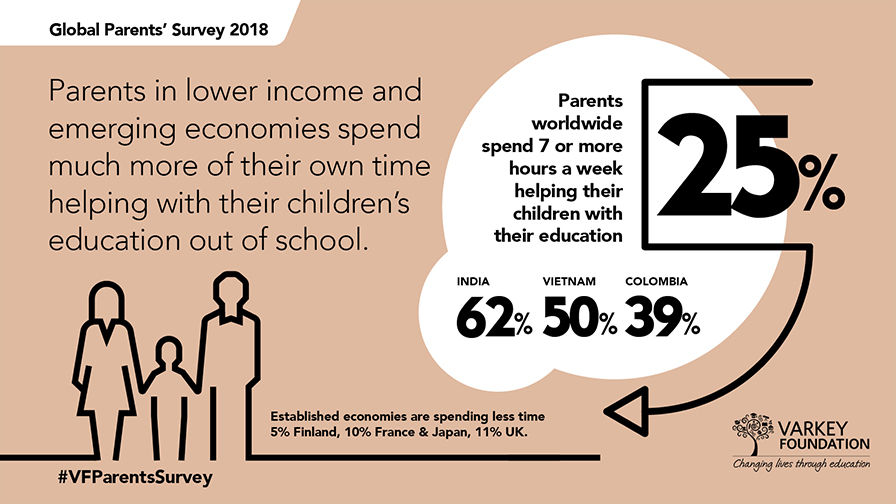
Global Parents' Survey
The biggest and most comprehensive survey of parents' hopes, fears and aspirations around the world.
27,500 parents in 29 countries across the world were asked a series of questions about their children’s education.
In December 2017, the Varkey Foundation commissioned Ipsos Mori to carry out the most comprehensive global study of the hopes, fears and aspirations of parents. We asked what they think of schools, what their priorities would be for education, and how well they think their children are prepared for 2030. Find out more about the report, access key data from across 29 countries and learn about the methodology.
Despite headlines of funding shortfalls and educational failure around the world, it's remarkable to see how much faith parents have in quality of teaching in their child's school. However good or bad their country's education system is, according to the global rankings, parents throughout the world have strong confidence in the abilities of their own child's teacher. And almost two-thirds of parents believe their child's school is preparing them well for the world of 2030 and beyond.
Click the flags below to view the key stats by country
Key Findings
KEY GLOBAL FINDINGS:
Quality of education
-
Parents’ confidence in the quality of teaching at their children’s schools is high globally, with 78% rating it good or very good. However, the same level of confidence is not being displayed in free to attend schools across the world, with only 45% of parents surveyed rating the quality of free to attend schools in their country as good. There is not always a relationship between confidence in teaching quality and PISA rankings. South Korea (43%) and Japan (61%) have among the lowest levels of confidence in quality of teaching at their child’s school despite being ranked 11th and 2nd out of 70 in PISA. Parents in the US (91%) have the second highest levels of confidence, despite the country being ranked 25th in PISA.
-
Parents are deeply divided about whether standards of education have got better or worse over the last ten years – 40% say better and 37% say worse. Some of the most pessimistic parents can be found in the big European economies. French parents are particularly pessimistic about education with only 8% saying standards have got better, followed by Germany (19%). Parents in the rapidly emerging Asian economies are far more positive - with 72% in India, and 70% in China and in Singapore saying that education has got better. Japan is the only Asian country below the survey global average at 21%.
-
The most important factor for parents when choosing their child’s school, alongside location, is the quality of teachers, with 45% of parents worldwide who had a choice of schools selecting it as one of their top three criteria. This is consistent across both parents of children at primary (44%) and secondary (45%) schools. After quality of teachers came a happy environment (30%), the school’s academic record (30%), school ethos (27%), quality of facilities (25%), approach to behavior and discipline (21%), cost of attending (19%), and extent to which schools consider the wishes of children (14%). Russians were most concerned about the quality of teachers, with 69% of parents selecting it as among their top three criteria, followed by the US (61%) and Vietnam (58%).
-
If there were additional funds for their child’s school, most parents would want them spent on teachers. Half (50%) of parents listed either more teachers or better pay for existing teachers as being among their top priorities. This is compared with 46% who would spend hypothetical additional funds for their child’s school on computers/technology, 44% for extracurricular activities, 37% for support staff, 37% for resources, and 34% for buildings and other facilities. Some of the highest demand for spending additional funds on teachers was in Western Europe with 76% of parents in Germany – the highest of any country surveyed – 70% in the UK and 65% in France. There was also high demand in the US (67%). The lowest demand for spending additional funds on teachers was in Indonesia (22%).
Below left: Nhial Deng, winner of the 2023 Global Student Prize meeting President Bill Clinton.
Below right: Global Teacher Prize 2019 winner Peter Tabichi from Kenya, receiving his trophy from Hugh Jackman.
PHOTOGRAPH © VARKEY FOUNDATION



































